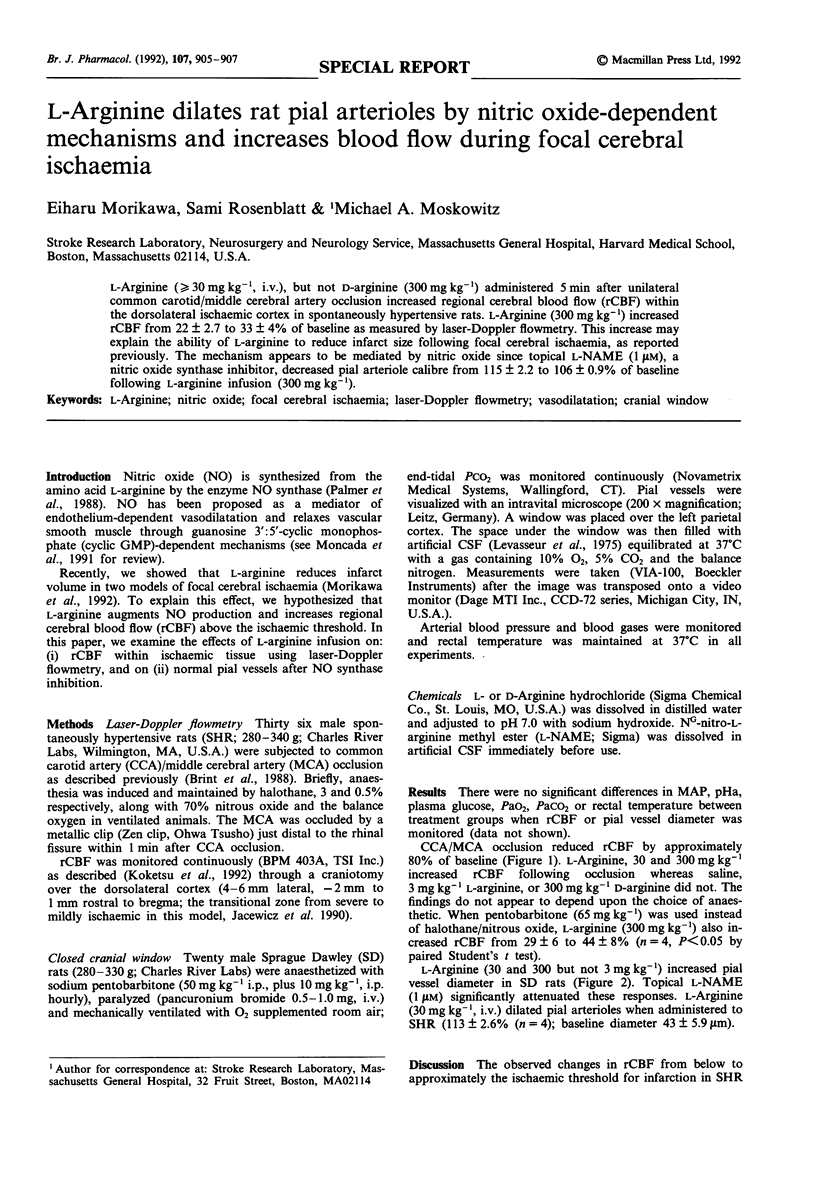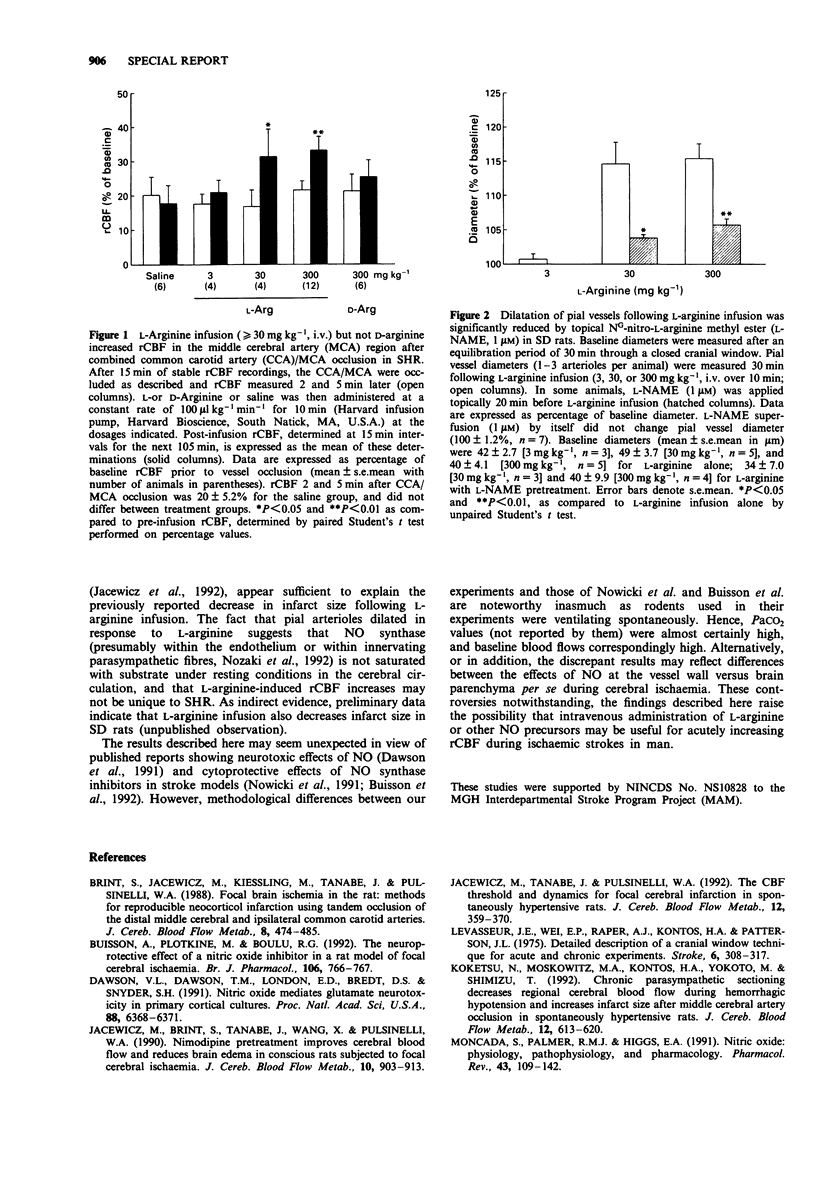Abstract
L-Arginine (> or = 30 mg kg-1, i.v.), but not D-arginine (300 mg kg-1) administered 5 min after unilateral common carotid/middle cerebral artery occlusion increased regional cerebral blood flow (rCBF) within the dorsolateral ischaemic cortex in spontaneously hypertensive rats. L-Arginine (300 mg kg-1) increased rCBF from 22 +/- 2.7 to 33 +/- 4% of baseline as measured by laser-Doppler flowmetry. This increase may explain the ability of L-arginine to reduce infarct size following focal cerebral ischaemia, as reported previously. The mechanism appears to be mediated by nitric oxide since topical L-NAME (1 microM), a nitric oxide synthase inhibitor, decreased pial arteriole calibre from 115 +/- 2.2 to 106 +/- 0.9% of baseline following L-arginine infusion (300 mg kg-1).
Full text
PDF


Selected References
These references are in PubMed. This may not be the complete list of references from this article.
- Brint S., Jacewicz M., Kiessling M., Tanabe J., Pulsinelli W. Focal brain ischemia in the rat: methods for reproducible neocortical infarction using tandem occlusion of the distal middle cerebral and ipsilateral common carotid arteries. J Cereb Blood Flow Metab. 1988 Aug;8(4):474–485. doi: 10.1038/jcbfm.1988.88. [DOI] [PubMed] [Google Scholar]
- Buisson A., Plotkine M., Boulu R. G. The neuroprotective effect of a nitric oxide inhibitor in a rat model of focal cerebral ischaemia. Br J Pharmacol. 1992 Aug;106(4):766–767. doi: 10.1111/j.1476-5381.1992.tb14410.x. [DOI] [PMC free article] [PubMed] [Google Scholar]
- Dawson V. L., Dawson T. M., London E. D., Bredt D. S., Snyder S. H. Nitric oxide mediates glutamate neurotoxicity in primary cortical cultures. Proc Natl Acad Sci U S A. 1991 Jul 15;88(14):6368–6371. doi: 10.1073/pnas.88.14.6368. [DOI] [PMC free article] [PubMed] [Google Scholar]
- Jacewicz M., Brint S., Tanabe J., Wang X. J., Pulsinelli W. A. Nimodipine pretreatment improves cerebral blood flow and reduces brain edema in conscious rats subjected to focal cerebral ischemia. J Cereb Blood Flow Metab. 1990 Nov;10(6):903–913. doi: 10.1038/jcbfm.1990.147. [DOI] [PubMed] [Google Scholar]
- Jacewicz M., Tanabe J., Pulsinelli W. A. The CBF threshold and dynamics for focal cerebral infarction in spontaneously hypertensive rats. J Cereb Blood Flow Metab. 1992 May;12(3):359–370. doi: 10.1038/jcbfm.1992.53. [DOI] [PubMed] [Google Scholar]
- Koketsu N., Moskowitz M. A., Kontos H. A., Yokota M., Shimizu T. Chronic parasympathetic sectioning decreases regional cerebral blood flow during hemorrhagic hypotension and increases infarct size after middle cerebral artery occlusion in spontaneously hypertensive rats. J Cereb Blood Flow Metab. 1992 Jul;12(4):613–620. doi: 10.1038/jcbfm.1992.85. [DOI] [PubMed] [Google Scholar]
- Levasseur J. E., Wei E. P., Raper A. J., Kontos A. A., Patterson J. L. Detailed description of a cranial window technique for acute and chronic experiments. Stroke. 1975 May-Jun;6(3):308–317. doi: 10.1161/01.str.6.3.308. [DOI] [PubMed] [Google Scholar]
- Moncada S., Palmer R. M., Higgs E. A. Nitric oxide: physiology, pathophysiology, and pharmacology. Pharmacol Rev. 1991 Jun;43(2):109–142. [PubMed] [Google Scholar]
- Nowicki J. P., Duval D., Poignet H., Scatton B. Nitric oxide mediates neuronal death after focal cerebral ischemia in the mouse. Eur J Pharmacol. 1991 Nov 12;204(3):339–340. doi: 10.1016/0014-2999(91)90862-k. [DOI] [PubMed] [Google Scholar]
- Palmer R. M., Ashton D. S., Moncada S. Vascular endothelial cells synthesize nitric oxide from L-arginine. Nature. 1988 Jun 16;333(6174):664–666. doi: 10.1038/333664a0. [DOI] [PubMed] [Google Scholar]


